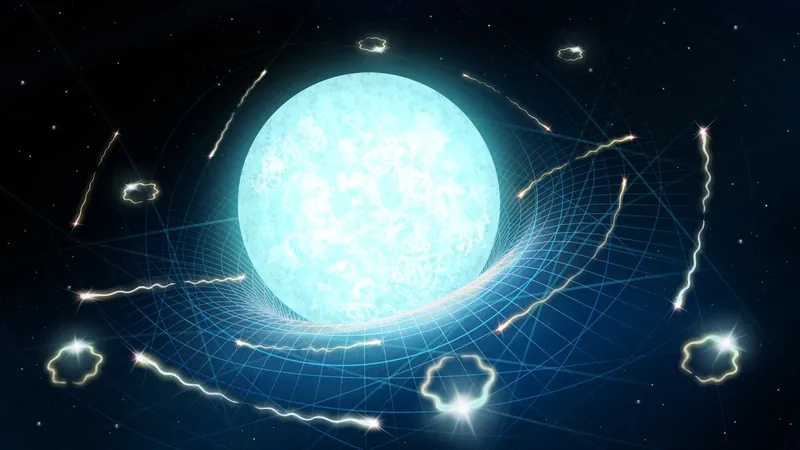
Apocalyptic Update: Universe is Decaying Faster Than We Imagined!
2025-05-12
Author: Emma
Shocking Discovery: Universe's End Looms Sooner than Anticipated
Prepare for a cosmic revelation: the universe is disintegrating much faster than researchers previously believed! A groundbreaking study by three Dutch scientists has unveiled a startling new timeline of cosmic decay, predicted to occur in roughly 10^78 years, a staggering reduction from the prior estimate of 10^100 years.
The Brilliant Minds Behind the Research
This eye-opening study comes from experts Heino Falcke, a black hole specialist, quantum physicist Michael Wondrak, and mathematician Walter van Suijlekom, all esteemed members of Radboud University in Nijmegen, Netherlands. Their findings were published in the *Journal of Cosmology and Astroparticle Physics*, building upon their earlier 2023 paper.
The Science of Decay: Hawking Radiation Explained
After initially revealing that not just black holes but also neutron stars can 'evaporate' through a mechanism known as Hawking radiation, the researchers faced burning questions from peers and the public alike. This follow-up investigation specifically targeted the duration of this decay process, leading to their shocking conclusion.
What Lies Ahead? The Ultimate Fate of the Universe
According to their calculations, the universe will reach its ultimate demise at about 10^78 years—considerably sooner than past predictions. This figure primarily focuses on white dwarf stars, identified as some of the last celestial remnants that will succumb to this radiative decay.
Lead author Heino Falcke commented, "The ultimate end of the universe comes much sooner than expected, but fortunately, it still takes a very long time!" This research challenges long-held beliefs and reshapes our understanding of cosmic longevity.
Rethinking Black Holes and Neutron Stars
In a fascinating twist, the researchers found that neutron stars and stellar black holes have identical evaporation timelines of 10^67 years, contradicting earlier assumptions that black holes, with their immense gravitational pull, would decay more quickly. Co-author Michael Wondrak explained the paradox, stating, "Black holes lack a surface, leading them to reabsorb some of their own radiation, which complicates their decay process."
What's a Human Life Span in the Cosmic Decay?
But the excitement didn’t end there! The scientists also calculated that a human and the moon would take about 10^90 years to decay through Hawking-like radiation. However, they playfully pointed out that other, faster processes could lead to their disappearance well before that.
A Multi-Disciplinary Approach to Cosmic Questions
Walter van Suijlekom highlighted the importance of this interdisciplinary study, emphasizing that merging astrophysics, quantum physics, and mathematics opens new avenues for understanding complex cosmic phenomena. "By exploring extreme cases and posing these kinds of questions, we aim to unravel the mysteries surrounding Hawking radiation—a quest for knowledge that continues!"









 Brasil (PT)
Brasil (PT)
 Canada (EN)
Canada (EN)
 Chile (ES)
Chile (ES)
 Česko (CS)
Česko (CS)
 대한민국 (KO)
대한민국 (KO)
 España (ES)
España (ES)
 France (FR)
France (FR)
 Hong Kong (EN)
Hong Kong (EN)
 Italia (IT)
Italia (IT)
 日本 (JA)
日本 (JA)
 Magyarország (HU)
Magyarország (HU)
 Norge (NO)
Norge (NO)
 Polska (PL)
Polska (PL)
 Schweiz (DE)
Schweiz (DE)
 Singapore (EN)
Singapore (EN)
 Sverige (SV)
Sverige (SV)
 Suomi (FI)
Suomi (FI)
 Türkiye (TR)
Türkiye (TR)
 الإمارات العربية المتحدة (AR)
الإمارات العربية المتحدة (AR)